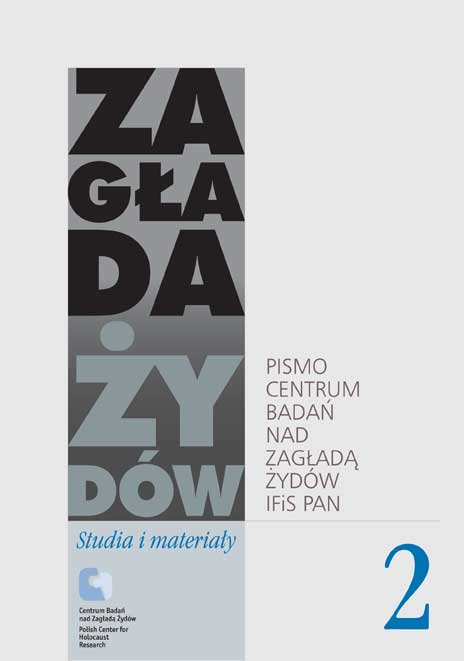Nazistowski mord na Żydach w prasie polskich komunistów (1942–1944).
Zagłada Żydów. Studia i Materiały, Nr 2 (2006), Strony: 54-75
Data zgłoszenia: 2020-10-11Data publikacji: 2006-12-02
 https://doi.org/10.32927/ZZSiM.180
https://doi.org/10.32927/ZZSiM.180
Abstrakt
Facing the decisive struggle between Nazism and Soviet communism for dominance in Europe, in 1942/43 Polish communists sojourning in the USSR espoused anti-German concepts of the political right. Their aim was an ethnic Polish ‘national communism’. Meanwhile, the Polish Workers’ Party in the occupied country advocated a maximum intensification of civilian resistance and partisan struggle. In this context, commentaries on the Nazi judeocide were an important element in their endeavors to influence the prevailing mood in the country: The underground communist press often pointed to the fate of the murdered Jews as a warning in order to make it clear to the Polish population where a deficient lack of resistance could lead. However, an agreed, unconditional Polish and Jewish armed resistance did not come about.
At the same time, the communist press constantly expanded its demagogic confrontation with Polish “reactionaries” and accused them of shared responsibility for the Nazi murder of the Jews, while the Polish government (in London) was attacked for its failure. This antagonism was intensified in the fierce dispute between the Polish and Soviet governments after the rift which followed revelations about the Katyn massacre. Now the communist propaganda image of the enemy came to the fore in respect to the government and its representatives in occupied Poland. It viewed the government-in-exile as being allied with the “reactionaries,” indifferent to the murder of the Jews, and thus acting ultimately on behalf of Nazi German policy. The communists denounced the real and supposed antisemitism of their adversaries more and more bluntly. In view of their political isolation, they coupled them together, in an undifferentiated manner, extending from the right-wing radical ONR to the social democrats and the other parties represented in the underground parliament loyal to the London based Polish government. Thereby communist propaganda tried to discredit their opponents and to justify the need for a new start in a post-war Poland whose fate should be shaped by the revolutionary left. They were thus paving the way for the ultimate communist takeover
Słowa kluczowe
Zagłada , Sowieci a Zagłada , prasa komunistyczna , Katyń , antysemityzm
Licencja
Prawa autorskie (c) 2006 Autor & "Zagłada Żydów. Studia i Materiały"

Utwór dostępny jest na licencji Creative Commons Uznanie autorstwa 4.0 Międzynarodowe.
https://creativecommons.org/licenses/by/4.0
Inne teksty tego samego autora
- Klaus Peter Friedrich, Isaiah Trunk, Łódź Ghetto: A History; Andrea Löw, Juden im Getto Litzmannstadt. Lebensbedingungen, Selbstwahrnehmung, Verhalten , Zagłada Żydów. Studia i Materiały: Nr 3 (2007)
Podobne artykuły
- Katarzyna Kuczyńska-Koschany, Erntefest – od etymologii do zastosowania , Zagłada Żydów. Studia i Materiały: Nr 15 (2019)
- Łukasz Krzyżanowski, „To było między pierwszą a drugą”. Zabójstwo Róży Berger podczas pogromu w Krakowie 11 sierpnia 1945 r. , Zagłada Żydów. Studia i Materiały: Nr 15 (2019)
- Esther Farbstein, „A we mnie płonie duchowa świeca”. Rabin Josef Guzik i jego dziennik , Zagłada Żydów. Studia i Materiały: Nr 15 (2019)
- Redakcja, Od Redakcji , Zagłada Żydów. Studia i Materiały: Nr 14 (2018)
- Stanisław Obirek, Zadziwiające milczenie polskiego Kościoła katolickiego o Holokauście , Zagłada Żydów. Studia i Materiały: Nr 15 (2019)
- Dariusz Libionka, Apocrypha from the History of the Jewish Military Union and its Authors , Zagłada Żydów. Studia i Materiały: 2008: Holocaust Studies and Materials
- Adam Kopciowski, Anti-Jewish Incidents in the Lublin Region in the Early Years after World War II , Zagłada Żydów. Studia i Materiały: 2008: Holocaust Studies and Materials
- Jan Grabowski, Lea Balint, The Diary of Hinda and Chanina Malachi , Zagłada Żydów. Studia i Materiały: 2008: Holocaust Studies and Materials
- Jacek Leociak, Literatura dokumentu osobistego jako źródło do badań nad Zagładą Żydów (Rekonesans metodologiczny) , Zagłada Żydów. Studia i Materiały: Nr 1 (2005)
- Jan Grabowski, Tadeusz Tomasz Krasnodębski, Policjant konspiratorem. Szesnaście lat na muszce Gestapo i bezpieki [Policeman-Conspirator. Sixteen years on a sight of Gestapo and State Security] , Zagłada Żydów. Studia i Materiały: 2010: Holocaust Studies and Materials
<< < 1 2 3 4 5 6 7 8 9 10 11 12 13 14 15 16 17 18 19 20 21 22 23 24 25 26 27 28 29 30 31 32 33 > >>
Możesz również Rozpocznij zaawansowane wyszukiwanie podobieństw dla tego artykułu.
 English
English
 Język Polski
Język Polski








